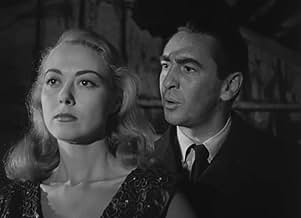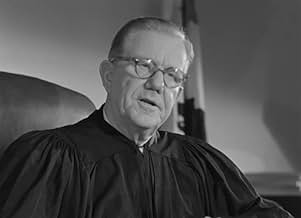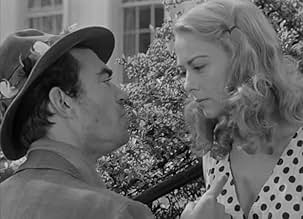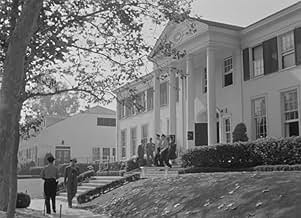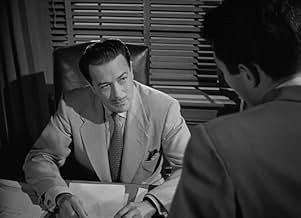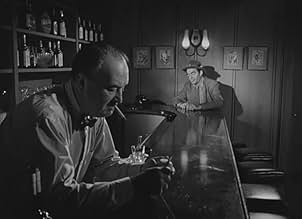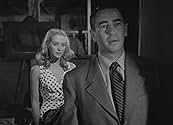PUNTUACIÓN EN IMDb
6,2/10
938
TU PUNTUACIÓN
Abogado defiende a un trabajador migrante acusado falsamente de dos asesinatos.Abogado defiende a un trabajador migrante acusado falsamente de dos asesinatos.Abogado defiende a un trabajador migrante acusado falsamente de dos asesinatos.
- Dirección
- Guión
- Reparto principal
Frank Baker
- Court Stenographer
- (sin acreditar)
Marshall Bradford
- Coroner
- (sin acreditar)
Ralph Brooks
- Courtroom Photographer
- (sin acreditar)
Benny Burt
- Citizen
- (sin acreditar)
Jack Carr
- Angry Citizen
- (sin acreditar)
Robert Carson
- Jury Foreman
- (sin acreditar)
Ralph Dumke
- Bartender
- (sin acreditar)
Richard Emory
- Reporter
- (sin acreditar)
Reseñas destacadas
MacDonald Carey stars as an Atticus Finch like attorney in Count The Hours where he's asked to defend George Craven who is accused of killing an elderly rancher and his wife. From the reactions around the town the two were beloved in the community and everyone just wants to hang Craven and be quick about it.
His defense of Craven puts Carey's own relationship with rich girl friend Dolores Moran in jeopardy. And he's certainly not winning any popularity contest defending Craven. Still Carey soldiers on until the truth emerges.
Don Siegel got some beautiful performances from several of his cast members. First Teresa Wright as Craven's wife who is the picture of innocence. Her innocence makes you the audience as well as Carey believe in the rightness of the cause. Also Adele Mara poaches on what is usually Gloria Grahame territory. She plays a real low life white trash slut and she does it magnificently.
Finally though there's Jack Elam who was a former hand at the deceased's place and he's a former mental patient. That blind eye of Elam's served him so well in films he could play some really loony characters. Elam is at his bug-eyed best in this part.
It's sad that Don Siegel did not have a bigger budget to work with. As it is Count The Hours is a real noir classic and Carey's Dave Madison belongs right up there with Atticus Finch in the pantheon of film's incorruptible men of the law.
His defense of Craven puts Carey's own relationship with rich girl friend Dolores Moran in jeopardy. And he's certainly not winning any popularity contest defending Craven. Still Carey soldiers on until the truth emerges.
Don Siegel got some beautiful performances from several of his cast members. First Teresa Wright as Craven's wife who is the picture of innocence. Her innocence makes you the audience as well as Carey believe in the rightness of the cause. Also Adele Mara poaches on what is usually Gloria Grahame territory. She plays a real low life white trash slut and she does it magnificently.
Finally though there's Jack Elam who was a former hand at the deceased's place and he's a former mental patient. That blind eye of Elam's served him so well in films he could play some really loony characters. Elam is at his bug-eyed best in this part.
It's sad that Don Siegel did not have a bigger budget to work with. As it is Count The Hours is a real noir classic and Carey's Dave Madison belongs right up there with Atticus Finch in the pantheon of film's incorruptible men of the law.
A robber breaks into a farm house. He is confronted by the owner and ends up killing the elderly couple. George Braden and his wife Ellen (Teresa Wright) are the neighbors. After some questionable responses, George is arrested for the murders. Doug Madison (Macdonald Carey) takes the case despite not believing in George's innocence.
At first, I thought some of this plot goes too far. I don't want to nitpick but I can't believe that they couldn't find the gun. Everybody knows where she threw it. It's not a raging river. Then I relaxed about it and realized that it's more about the acting style. The movie is doing that old melodramatic style. Teresa Wright is a great actress, but she's using her skills to do her utmost overwrought acting. I actually grew to like the plot especially if they could tweak some of it. I can see it be remade into something better.
At first, I thought some of this plot goes too far. I don't want to nitpick but I can't believe that they couldn't find the gun. Everybody knows where she threw it. It's not a raging river. Then I relaxed about it and realized that it's more about the acting style. The movie is doing that old melodramatic style. Teresa Wright is a great actress, but she's using her skills to do her utmost overwrought acting. I actually grew to like the plot especially if they could tweak some of it. I can see it be remade into something better.
MacDonald Carey stars as a public defender taking on the case of a migrant farm worker accused of killing his employer in this unusual RKO production. Directed stylishly by Don Siegel and marvelously photographed by the great John Alton, whose penchant for deep, angular shots is on display throughout, Count the Hours has plenty of the ingredients you'd expect a noir classic to feature. Sadly, it's let down by a drab screenplay by Karen Dewolf and a dull, Lon Chaney Jr.-style performance by John Craven as the falsely accused handy man. The film also suffers from a Louis Forbes score that features an overdone theremin theme whenever the real villain appears on the screen. Count the Hours looks great and also features good performances by Teresa Wright (in a role that seems tailor made for Patricia Neal) and Jack Elam, but on balance, it remains a frustrating though watchable failure.
A lawyer defends a migrant worker falsely accused of two murders.
What is interesting, first of all, is how the defendant is described as a "migrant worker". That is not incorrect, but I think perhaps the connotation in 1953 is different than in 2017, because now the term would almost exclusively be referring to a Latino employee. In fact, the United Nations defines a migrant worker as "a person who is engaged or has been engaged in a remunerated activity in a State of which he or she is not a national." This, more often than not, would be Mexican farmhands in the case of the United States.
Anyway, the film is quite good. I don't know if it was a feature or a B-movie, as it does give the impression of not having big names attached and perhaps a smaller budget. But for entertainment purposes and a but of suspense, it does the job. In retrospect, it also serves as a great example of early work from director Don Siegel.
What is interesting, first of all, is how the defendant is described as a "migrant worker". That is not incorrect, but I think perhaps the connotation in 1953 is different than in 2017, because now the term would almost exclusively be referring to a Latino employee. In fact, the United Nations defines a migrant worker as "a person who is engaged or has been engaged in a remunerated activity in a State of which he or she is not a national." This, more often than not, would be Mexican farmhands in the case of the United States.
Anyway, the film is quite good. I don't know if it was a feature or a B-movie, as it does give the impression of not having big names attached and perhaps a smaller budget. But for entertainment purposes and a but of suspense, it does the job. In retrospect, it also serves as a great example of early work from director Don Siegel.
Surprisingly interesting story for a B picture from the early fifties - this could have been made as a major feature if it was given a bigger budget and a director worthy of its plot developments. Sincere performances by Teresa Wright and McDonald Cary are well above the average but director Don Siegel is just not the right man for the job. The story by Doane Hoag has all the right twists and turns and holds the interest but needed more attention to detail and less clichéd handling. The music score was certainly different but seemed to have been lifted from a Si-Fi -'body snatcher' type movie.
If looking for a 50s time passer (with undeveloped possibilities) this is still worth a look. Prolific and inventive Award winning Hungarian cinematographer John Alton shows terrific flair for B/W photography and lighting - lifting this little crime meller to above average standards. The ending is typical of the era - but, still better than many other average B pictures.
If looking for a 50s time passer (with undeveloped possibilities) this is still worth a look. Prolific and inventive Award winning Hungarian cinematographer John Alton shows terrific flair for B/W photography and lighting - lifting this little crime meller to above average standards. The ending is typical of the era - but, still better than many other average B pictures.
¿Sabías que...?
- CuriosidadesAfter Director of Photography John Alton agreed to shoot this movie, he asked Producer Benedict Bogeaus how much he had budgeted for rigging - the system of overhead pipes, brackets, ropes, and cables that suspend lights over a film set. Bogeaus told him four thousand dollars. "Give me two thousand dollars above my salary and I won't use any rigging," said Alton. He did it by using almost no overhead lighting at all, contributing to the film's rich visual atmosphere.
- PifiasThe screen shows a newspaper article stating that George Braden is about to go on trial for the murder of Fred Morgan. However, two people were killed, so both names should have been given.
- ConexionesReferenced in Mau Mau Sex Sex (2001)
Selecciones populares
Inicia sesión para calificar y añadir a tu lista para recibir recomendaciones personalizadas
Detalles
- Duración
- 1h 16min(76 min)
- Color
- Relación de aspecto
- 1.37 : 1
Contribuir a esta página
Sugerir un cambio o añadir el contenido que falta

